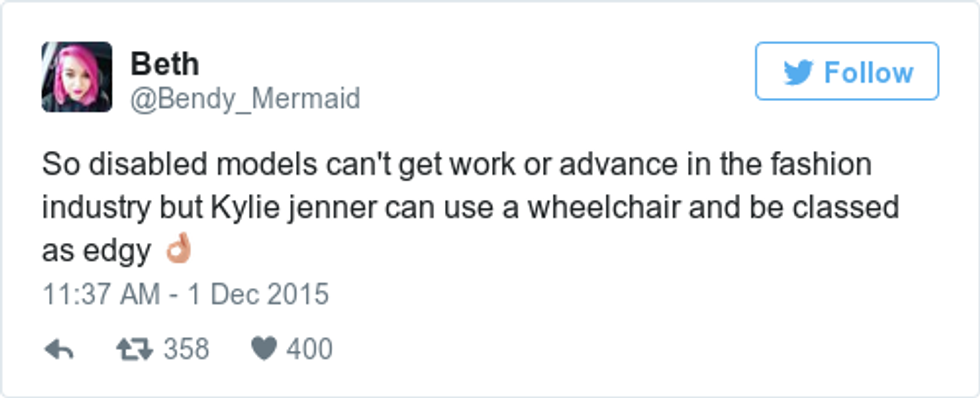Stiff, vulnerable, and clad in a tight, shiny leotard, Kylie Jenner's Interview magazine photo shoot was released last week, displaying several photographs of her in a wheelchair. Why is fetishizing the disabled becoming a catalyst for celebrities to gain more attention? Jenner is pictured wearing a lustrous black bodysuit, her neck and ankles restricted as if binding her to the chair. She's using a wheelchair to suit her chosen aesthetic and appear high fashion. This sick glamorization of disabilities to appear "fashionable" and "sexy" cannot continue.
Fetishization of disabilities is rooted in sexism and rape fantasy. Domination of a victim with no control to fight back is at the root of this sexualization of being in a wheelchair. If people understood the origin of this corrupt infatuation, would they finally stop using disabilities to promote their brands and celebrities? Simply making this a feminist issue does not address the corruptness of turning a disability into a commodity, while businesses and the celebrities who advertise for them profit from it.
Jenner's recent fraudulent portrait of disabilities is not at all revolutionary. Lady Gaga's 2008 music video for "Paparazzi" shows Gaga being carried out of a limo in the similar doll-like pose as Jenner's. She is then placed in a wheelchair and eventually uses crutches. The issue is not the plot of Gaga being injured and needing assistance. What is troubling is the use of assistive mechanisms as ornaments to appear ostentatious and chic.
Aside from other accounts, Jenner herself has been guilty of appropriation in the past. Several months ago, she was accused of blackface when she posted images from her photo shoot by Marcelo Cantu on Instagram. The pictures showed Jenner with what she labeled a "black light and neon lights," which made her skin appear exceptionally darker than its natural color. These are not the only examples of times Jenner has been accused of cultural appropriation.
Disabled people are deeply offended by Jenner's photo shoot. These photographs are taken with ablest privilege, pretending to be disabled when it's most convenient to capture a "vision" or make a "statement". Ophelia Brown tweeted a photo of herself in her wheelchair next to Jenner's, writing: "@KylieJenner wow being in a wheelchair is so fun and fashionable! #Ableism is the ultimate fashion statement!" People who are disabled don't have choice but to live with their disability. There is no "on" and "off" switch to suddenly make life easier when they so choose and magically make their disabilities disappear.
Although able-bodied people portraying themselves as disabled are heavily criticized, ableism is still common in the fashion and music industry. When actual disabled people are featured in fashion and other media, their disabilities are still put on display for marketing purposes. Commodifying someone's disability, or any other kind of difference as a prop, is not only disrespectful but downright cruel. It's time to put an end to this heinous "fashion statement" once and for all.























